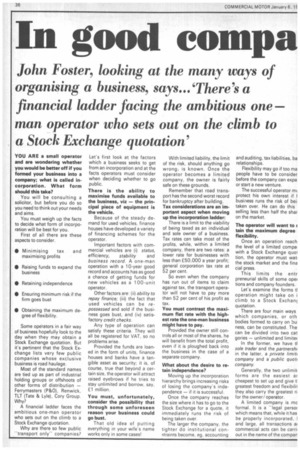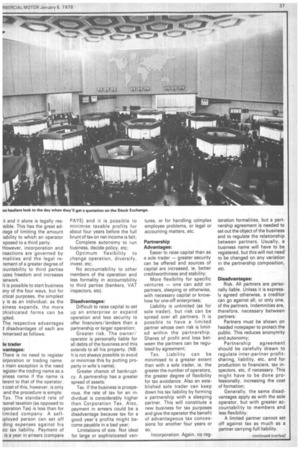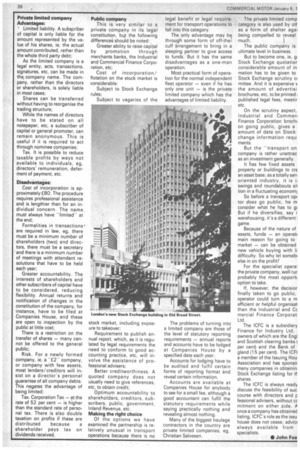In good compa
Page 38

Page 39

Page 40

If you've noticed an error in this article please click here to report it so we can fix it.
John Foster, looking at the many ways of organising a business, says...`There's a financial ladder facing the ambitious one man operator who sets out on the climb to a Stock Exchange quotation'
YOU ARE a small operator and are wondering whether you would be better off if you formed your business into a company; what is called incorporation. What form should this take?
You will be consulting a solicitor, but before you do so you need to think out your needs and aims.
You must weigh up the facts to decide what form of incorporation will be best for you.
First of all there are these aspects to consider.
• Minimising tax and maximising profits • Raising funds to expand the business • Retaining independence • Ensuring minimum risk if the firm goes bust • Obtaining the maximum degree of flexibility.
Some operators in a fair way of business hopefully look to the day when they may obtain a Stock Exchange quotation. But it's pertinent that the Stock Exchange lists very few public companies whose exclusive business is road haulage.
Most of the standard names are tied up as part of industrial holding groups or offshoots of other forms of distribution — Ferrymasters (P&O), Renwick, TLT (Tate & Lyle), Cory Group. Why?
A financial ladder faces the ambitious one-man operator who sets out on the climb to a Stock Exchange quotation.
Why are there so few public -transport only companies?
Let's first look at the factors which a business seeks to get from an incorporation and at the facts operators must consider when deciding whether to go public.
There is the ability to maximise funds available to the business, viz — the principal piece of equipment is the vehicle.
Because of the steady demand for used vehicles, finance houses have developed a variety of financing schemes for the operator.
Important factors with commercial vehicles are (i) status,
efficiency, stability and business record. A one-man operation with a 10-year good record and accounts has as good a chance of getting funds for new vehicles as a 100-unit operator.
Other factors are (ii) ability to repay finance; (iii) the fact that used vehicles can be repossessed and sold if the business goes bust, and (iv) satisfactory credit checks.
Any type of operation can satisfy these criteria_ They will all be registered for VAT, so no problems arise.
Provided the funds are loaned in the form of units, finance houses and banks have a tangible asset as security; it is, of course, true that beyond a certain size, the operator will attract raised eyebrows if he tries to stay unlimited and borrow, say, £1 million.
You must, unfortunately, consider the possibility that through some unforeseen reason your business could go bust.
That old idea of putting everything in your wife's name works only in some cases! With limited liability, the limit of the risk, should anything go wrong, is known. Once the operator becomes a limited company, the owner is fairly safe on these grounds.
Remember that road transport has the second worst record for bankruptcy after building. Tax considerations are an important aspect when moving up the incorporation ladder: There is a limit to the viability of being taxed as an individual and sole owner of a business. Tax rates can take most of the profits, while, within a limited company, there are two rates: a lower rate for businesses with less than £50,000 a year profit; general corporation tax rate at 52 per cent.
So even when the company has run out of items to claim against tax, the transport operator will not have to pay more than 52 per cent of his profit as tax.
You must contrast the maximum flat rate with the highest rate the one-man business might have to pay.
Provided the owner still controls all or most of the shares, he will benefit from the total profit, even if it is ploughed back into the business in the case of a separate company.
What about the desire to retain independence?
Moving up the incorporation hierarchy brings increasing risks of losing the company's independence — if it is successful.
Once the company reaches the size where it has to go to the Stock Exchange for a quote, it immediately runs the risk of being taken over.
The larger the company, the tighter do institutional constraints become, eg, accounting and auditing, tax liabilities, ba relationships.
Flexibility may go if too ma people have to be consider before the company can expa or start a new venture_ The successful operator mt protect his own interest if I business runs the risk of bei taken over. He can do this selling less than half the shar on the market.
The operator will want to tam n the maximum degree flexibility.
Once an operation reach the level of a limited compa with a Stock Exchange quoi tion, the operator must wat. the stock market and the fine cial press.
This limits the entr preneurial skills of some opei tions and company founders.
Let's examine the forms ti operation might take on i climb to a Stock Exchanc quotation.
There are four main ways which companies, or oth bodies formed to carry on `..-N.0 ness, can be constituted. The can be divided into two cat gories — unlimited and limiter
In the former, we have tl sole trader and the partners hi in the latter, a private company and a public quoti company.
Generally, the two unlimit forms are the easiest ar cheapest to set up and give t greatest freedom and flexibilii they also carry the greatest ri for the owner/ operator.
A limited company is mc formal, It is a "legal persor which means that, while it has be properly incorporated, and large, all transactions ai commercial acts can be carri. Out in the name of the compar it and it alone is legally resIsible. This has the great aditage of limiting the amount iability to which an operator .xposed to a third party.
However, incorporation and nsactions are governed by malities and the legal rerement of a greater degree of :ountability to third parties uces freedom and increases )erwork.
It is possible to start business 3ny of the four ways, but for Ictical purposes, the simplest y is as an individual; as the siness expands, the more ahisticated forms can be )pted.
The respective advantages I disadvantages of each are nmarised as follows: le trader vantages:
There is no need to register orporation or trading name. a main exception is the need -egister the trading name as a 3iness name if the name is ferent to that of the operator. a cost of this, however, is only and the procedure is simple: Tax. The standard rate of -sonal taxation (as opposed to rporation Tax) is less than for limited company. A selfiployed person can set off ding expenses against his 'Sic tax liability. Payment of is a year in arrears (compare
PAYE) and it is possible to minimise taxable profits for about four years before the full brunt of tax on net income is felt; Complete autonomy to run business, decide policy, etc; Optimum flexibility to change operation, diversify, invest, etc; No accountability to other members of the operation and less formality in accountability to third parties (bankers, VAT inspectors, etc).
Disadvantages: Difficult to raise capital to set up an enterprise or expand operation and less security to offer financiers/ lenders than a partnership or larger operation; Greater risk. The owner/ operator is personally liable for all debts of the business and this extends to all his property. (NB: It is not always possible to avoid or minimise this by putting property in wife's name); Greater chance of bankruptcy. A partnership has a greater spread of assets; Tax. If the business is prosperous, the rate of tax for an individual is considerably higher than Corporation Tax, Also, payment in arrears could be a disadvantage because tax for a good year's profits might become payable in a bad year; Limitations of size. Not ideal for large or sophisticated yen tures, or for handling complex employee problems, or legal or accounting matters, etc.
Partnership Advantages: Easier to raise capital than as a sole trader — greater security can be offered and sources of capital are increased, ie, better creditworthiness and stability; More flexibility for specific ventures — one can add on partners, sleeping or otherwise, with necessary capital or knowhow for one-off enterprises; Liability is unlimited (as for sole trader), but risk can be spread over all partners. It is possible to have a limited partner whose own risk is limited within the partnership_ Shares of profit and loss between the partners can be regulated by agreement; Tax. Liability can be minimised to a greater extent than with a sole trader, ie, the greater the number of operators, the greater degree of flexibility for tax avoidance. Also an established sole trader can keep down his tax liability by forming a partnership with a sleeping partner. This will constitute a new business for tax purposes and give the operator the benefit of advantageous tax concessions for another four years or so; Incorporation. Again, no reg istration formalities, but a partnership agreement is needed to set out the object of the business and to regulate the relationship between partners. Usually, a business name will have to be registered, but this will not need to be changed on any variation in the partnership composition, etc.
Disadvantages: Risk. All partners are personally liable, Unless it is expressly agreed otherwise, a creditor can go against all, or only one, of the partners. Indemnities are, therefore, necessary between partners: Partners must be shown on headed notepaper to protect the public. This reduces anonymity and autonomy; Partnership agreement should be carefully drawn to regulate inter-partner profitsharing, liability, etc, and for production to financiers, tax inspectors, etc, if necessary. This might have to be done professionally, increasing the cost of formation; Generally, the same disadvantages apply as with the sole operator, but with greater accountability to members and less flexibility; A limited partner cannot set off against tax as much as a partner carrying full liability. Private limited company Advantages: ' Limited liability. A subscriber of capital is only liable for the amount represented by the value of his shares, ie, the actual amount contributed, rather than the whole third party debt; As the limited company is a legal entity, acts, transactions, signatures, etc, can be made in the company name. The company, rather than the directors or shareholders, is solely liable in most cases; Shares can be transferred without having to reorganise the trading structure; While the names of directors have to be stated on all notepaper, etc, a subscriber of capital or general promoter, can remain anonymous. This is useful if it is required to act through nominee companies; Tax. It is possible to reduce taxable profits by ways not available to individuals, eg, directors' remuneration, deferment of payment, etc.
Disadvantages: Cost of incorporation is approximately £80. The procedure requires professional assistance and is lengthier than for an individual concern. The name must always have "limited" at the end; Formalities in transactions are required in law, eg, there must be a minimum number of shareholders (two) and directors, there must be a secretary and there is a minimum number of meetings with attendant resolutions that have to be held each year; Greater accountability. The interests of shareholders and other subscribers of capital have to be considered, reducing flexibility. Annual returns and notification of changes in the constitution of the company, for instance, have to be filed at Companies House, and these are open to inspection by the public at little cost; There is a restriction on the transfer of shares — many cannot be offered to the general public; Risk. For a newly formed company, ie, a "E2" company, or company with few assets, most lenders/ creditors will insist on a director's personal guarantee of all company debts. This negates the advantage of being limited; Tax. Corporation Tax — at the rate of 52 per cent — is higher than the standard rate of personal tax. There is also double taxation on profits if these are distributed because a shareholder pays tax on dividends received. Public company
This is very similar to a private company in its legal constitution, bu,t the following differencesshould be noted:.
Greater ability to raise capital by promotion through merchants banks, the Industrial and Commercial Finance Corporation, etc; Cost of incorporation/ flotation on the stock market is considerable; Subject to Stock Exchange rules; Subject to vagaries of the stock market, including exposure to takeover; Requirement to publish annual report, which, as it is regulated by legal requirements the need to conform to good accounting practice, etc, will involve the assistance of professional advisers; Better creditworthiness. A quoted company does not usually need to give references, etc, to obtain credit; Optimum accountability to shareholders, creditors, subscribers, public, government, Inland Revenue, etc.
Making the right choice
Of the options we have examined the partnership is relatively unusual in transport operations because there is no
legal benefit or legal requirement for transport operations to fall into this category.
The only advantage may 11 through some form of off-thecuff arrangement to bring in a sleeping partner to give access to funds. But it has the same disadvantages as a one-man operation.
Most practical form of operation for the normal independent fleet operator — even if he has only one unit — is the private. limited company which has the advantages of limited liability.
The problems of turning into a limited company are those of the level of statutory reporting requirements — annual reports and accounts have to be lodged at Companies House by a specified date each year.
Accounts for lodging have to be audited and fulfil certain forms of reporting format and reveal certain information.
Accounts are available at Companies House for anybody to see for a small fee, although a good accountant can fulfil the statutory requirements while saying practically nothing and revealing almost nothing.
Many of the biggest haulage contractors in the country are private limited companies, eg, Christian Salvesen.
The private limited comp category is also used by otlas a form of shelter agai being compelled to reveal much.
The public company is ultimate level in business.
But to become one, ie, Stock Exchange quotatior considerable amount of in mation has to be given to Stock Exchange scrutiny cc mittee. And it is expensive v the amount of advertisi brochures, etc, to be printed published legal fees, meetir etc.
On the scrutiny aspect, Industrial and Commerc Finance Corporation brochi on going public, gives a amount of data on Stock change information requ ments.
But the "transport on company is rather unattrac. as an investment generally.
It has few fixed assets property or buildings to cr€ an asset base; as a totally sen oriented industry, it is ii swings and roundabouts sii tion in a fluctuating econom)
So before a transport op( tor does go public, he m consider what he has to g( But if he diversifies, say i warehousing, it's a different I game.
Because of the nature of assets, funds — an operatc main reason for going to market — can be obtained new vehicle buying with Ii difficulty. So why let somebc else in on the profit?
For the specialist operai the private company, well rur probably the most opporti option to take.
If, however, the decisior finally taken to go public, operator could turn to a m efficient or helpful organisat than the Industrial and Cc mercial Finance Corporat Ltd.
The 1CFC is a subsidiary Finance for Industry Ltd, owners of which are the Engl and Scottish clearing banks per cent) and the Bank of gland (15 per cent). The ICF( a member of the Issuing Hou Association and has sponso many companies in obtainin Stock Exchange listing for tf shares.
The ICFC is always ready discuss the feasibility of suc course with directors and p fessional advisers, without cc mitment on either side. A once a company has obtained listing, ICFC's role as the issu house does not cease; advic( always available from specialists.




















































































